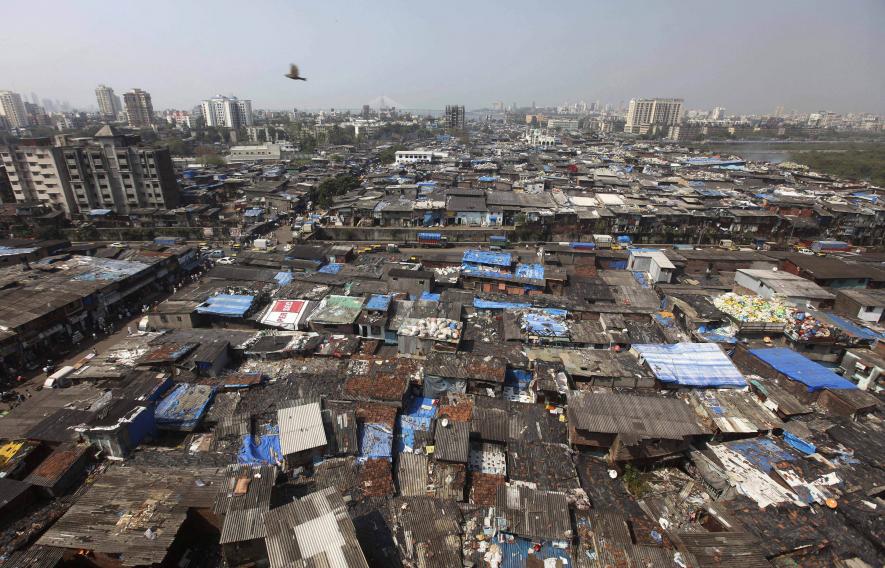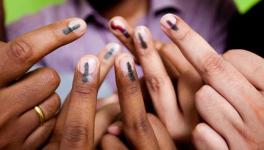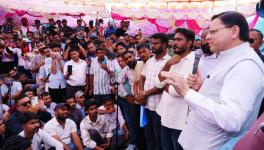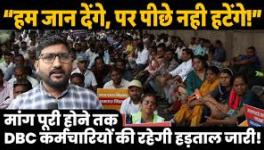Awareness Drive for Slum Dwellers, Booklet Takes Stock of Performance of Various Governments

As the political parties gear up for the upcoming assembly elections in Karnataka, the candidates have resorted to the most effective campaigning formula in the book: door to door visits in their constituencies. It’s a routine practice for the candidates to meet people in person, make promises and claim to fulfil them if they manage to win. There is nothing extraordinary or unique about this.
However, Badukayya (name changed) living in a slum in the heart of the city, says: “They come when they need votes to win, and after that, neither do we know where they are, and nor do they know where we are!” Candidates coming to visit these citizens once every five years is a ritual. I visited two slums in the city – determined to find answer to the question: why do they vote?
As I embarked upon my missions, I met Chandramma – the state level woman convener of Slum Janandolana Karnataka (SJK). She was also visiting the slum dwellers, talking about the upcoming elections. SJK is an organisation that works and fights for the rights of slum dwellers in the state. It has presence in 18 districts across the state. Addressing a group of youth, sitting in a makeshift shed in one of the slums – standing right next to a dumping yard of the city, she says, “I request you all not to fall for political campaigning of any of these political parties, just because they give you Rs 500-600; or alcohol. Refuse to go with them, especially BJP, the party which can use you for horrible things like Komu Vada …What do they think? It is you, the youth in the slums, who they want to do everything for elections: starting from tying up the banners to patrolling around the city holding their party flags, they want you; but after elections? Where will they be?”
Chandramma was referring to the extravaganza that the political parties create around elections. There are hoardings and banners everywhere in the city; there are young boys giving away pamphlets of these parties in busy areas – around the city bus stops and railway stations. There are boys on motorbikes with party flags in their hands, patrolling around the city.
Speaking to Newsclick, Narasimhamurthy, state convener, SJK had also noted that the parties use slum dwellers as cheap labour for campaigning.
Appealing to a group of men and women in the first slum we visited, Chandramma asked them to tell these candidates that they are going to vote for them and also to tell them the demands that the slum dwellers have. She asked if the promises made by the political parties are ever fulfilled. Enraged Jayamma (name changed) said, “Ayya! Nothing, we don’t get anything. They say a lot of things, amma. We just hope that they don’t throw us out from here. They just say a lot, but do nothing for us.” Chandramma responded to Jayamma, “It is better if the slum dwellers tell these parties what they want, rather than letting them make false promises.”
Chandramma handed over a leaflet of SJK that she was distributing to people in the slums. The leaflet is a manifesto prepared by SJK. She read out all the 10 demands that the manifesto listed and explained the rationale behind every demand. Following are the ten demands in the Manifesto of SJK for 2018 elections:
- The slum dwellers should be given land ownership rights.
- A separate ministry for the development of slums should be set up.
- Based on the 2011 census, there should be a share for the slum dwellers in the budget.
- A law for right to housing should be formulated in the state.
- Based on the report submitted to the government on 24/2/2018 by the Institute of Public Policy, Karnataka Slum Development Act, 2018 should be brought into force.
- Involving the private companies in programs and projects of the state should be given up.
- Empowering the Government Schools report of 2017 by Professor. S J Siddaramaiah should be brought into force.
- The government should ensure safety and security of the under privileged in the cities.
- Basic facilities of emergency health care centers, pension and wages should be provided for every ward.
- Based on the 2017 caste census, the social justice system should be put in place.
In the context of the upcoming assembly elections in the state, SJK has put together a booklet to educate slum dwellers about the elections. This booklet is in Kannada, and takes stock of the work done by the current Congress government, and Bharatiya Janata Party (BJP), and Janata Dal (Secular) (JD(S)) governments in the interest of slum dwellers in the past. Chadramma feels that it is very important to go back and look at the things that have happened in the past.
According to the booklet, the incumbent Congress government has waived off loans worth Rs 276 crore for 56,000 slum dwellers in 2014. Under Rajiv Awas Yojana, the government has constructed 36,000 houses. In 2016, 15 per cent of money deducted for this program by the central government was deposited by the state government in the account of the urban development board, in the interest of 25,000 SC/ST families. In 2015-2016, the government had proposed formation of a slum act. In July 2016, the act was recorded, and the work has begun to implement it. As a part of the housing for all programme – Pradhan Mantri Awas Yojana – the government amended the Karnataka Land Revenue Act, 1964 and the amendment 94cc was implemented by ensuring land entitlement for slum dwellers. In the budget for the financial year 2017-2018, the government has allocated Rs 140 crore for slum development. Bengaluru slum dwellers were provided with 10,000 liters of water free of cost.
Based on the census data, the government has set up land banks within the city limits, in order to ensure housing for the homeless. The government allocated 2,000 acers of land within the limits of Mahanagara Palike, 500 acres in the areas under Mahanagara Palike, 250 acres in the urban and semi-urban areas, and 100 acres in rural Bengaluru panchayati areas, in 2018-2019 budget for the state. However, this government was not successful in granting land ownership rights to the slum dwellers, and providing housing for all the slum dwellers, as they had promised.
SJK notes that the NDA government that came to power at the Centre in 2014, has absolutely failed in addressing the problems of the slum dwellers. It also reflects on the BS Yeddyurappa’s government in 2008 and its plans for the slum dwellers.
According to the booklet, NDA renamed already existing Rajiv Awas Yojana to Pradhan Mantri Awas Yojana and reduced subsidies from Rs 4 lakh to 1.5 lakh. Narendra Modi’s government also has declared the land of slums a public resource – giving free invitation to corporate and construction companies to snatch away the land from slum dwellers. Along with this, demonetisation had resulted in the slum dwellers losing their daily wages for six months. This was followed by introduction of GST, which made a simple meal in the restaurant unaffordable for the poor.
In 2009, when the BJP government was in power in the state, hundreds of poor and Dalits living in a slum in Kormangala’s 15.64 acres of EWS land were forcefully evicted. The land was given to the industrialist and BJP member Uday Garudachar to construct a mall. Police were deployed in the slums, and the dwellers were subjected to brutal physical assault when they were being evicted. According to SJK, 40 women, who protested this move, were arrested and stripped in the police station. This attack of the state on the people living in EWS quarters has remained as a black day in the history of Karnataka. SJK, in the booklet, says that the slum dwellers in Karnataka know what they are for BJP and Yeddyurappa.
Commenting on JD(S)’s stand on slum dwellers, SJK notes that Devegowda’s move of dissolving the City Land Act for making land a private property, resulted in the boom for the business of the real estate in the city.
As the group of men and women patiently listened to Chandramma, they interjected multiple times. Largely, it was seen that people associated BJP with the increase in the atrocities on Dalits, women, children and their Muslim neighbourhoods.
As Chandramma started packing, women around her started asking her about the water problems that they were facing in their area. They decided to go and meet the MLA of the constituency the next day. Jayamma (name changed), who was not very happy about this, remarked, “Nothing happens here without fighting, facing goondas and police. Nothing changes even if you vote.”
Get the latest reports & analysis with people's perspective on Protests, movements & deep analytical videos, discussions of the current affairs in your Telegram app. Subscribe to NewsClick's Telegram channel & get Real-Time updates on stories, as they get published on our website.
























